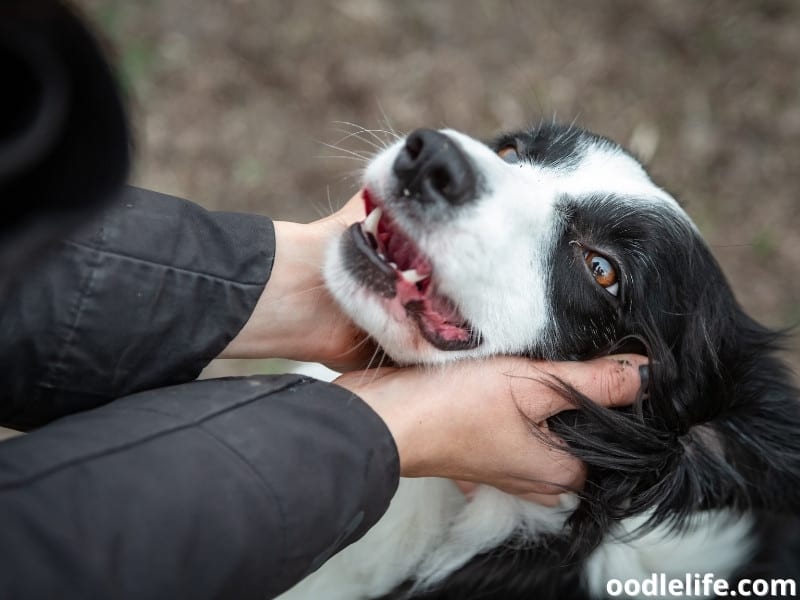Understanding a Dog’s Memory

Although simpler than human memory, dogs can recognize their owner’s voice or associate the chink of your car keys with going somewhere. We call this associative memory, but dogs also have episodic memory. Let’s examine these in greater detail.
Dogs have a short-term memory, lasting up to two minutes, which explains why it’s necessary to act immediately when a dog does something wrong. Any action you take will be ineffective after that time. Interestingly, bigger dogs have a more extended short-term memory than smaller ones (source).
Dogs are very forgiving and want to please, so long as you do not habitually abuse your dog or use excessive force, the dog is unlikely to remember it beyond two days, if they don’t forget within two minutes.
The stronger your relationship is with your dog, the quicker the memory will be erased. Dogs tend to feed directly off your energy, so as long as you exhibit calm and positive energy, they will likely bounce right back.
Associative memory is where the dog connects a sound, smell, the sight of something, or some other sensation to an event, usually one that is pleasant to the dog. For example, if your dog sees their leash in your hand, they can immediately associate this with the happy prospect of going for a walk (source).
Dogs have a wonderful scent and sound memory, and can even associate the fading of their master’s scent with the passage of time. One study found that a dog could associate their owner’s remaining scent level with the time that they would return home.
Several animals show that they have very strong and long-lasting associative memories, such as a dog that remembers the smell of a vet after surgery (source).
The high level of association through sensation also applies to a dog that has been hit. If you strike them more than once in a similar context, they may begin to associate being hit within that context, making this a form of long-term associative memory.
While this is useful for training through the use of mild corrective taps, the use of excessive force can quickly result in the dog associating you with negative treatment, placing your relationship with the dog on the wrong foot.
A Hungarian study in 2016 revealed that dogs also have episodic memory, which is the ability to remember explicit events from the past (source). It differs from associative memory in that it is based on more than simply the relationship between two things.
Episodic memory is one component of declarative memory. With episodic memory, a dog has the ability to “refer back” and recall information about the circumstance or place when you hit them (source).
What the researchers did was have dogs imitate an action by their owners by using the “Do it” command. They next underwent a training session where the dogs had to lie down after seeing a human action, regardless of what that action was.
The objective was to take away the expectation that they had to remember their owner’s action to imitate it. Suddenly, they would switch things up, and the owner would issue the “Do it” command after performing an action. The dogs would still imitate their owner’s move successfully.
They even tried issuing the command over a range of times from one minute to one hour. While the dogs’ accuracy faded over time, they were still able to imitate the action most of the time.
Form Better Habits to Avoid Hitting Your Dog

There may have been a time when you felt you had to hit your dog to prevent them from injuring themselves, someone else, or another dog. For example, if your dog happened to attack another dog or even a person, you would be naive to think that a mild “down Fido” would help.
The dog probably has no idea why you did what you did, but they will likely never even recall the event unless you really overdid it.
This situation also illustrates how important it is to have control over your dog. If you wish to retain control of your dog, you need to remain calm and assertive; otherwise, the dog may take over as the alpha. Learn to use assertive methods such as a deep, unsettling voice while maintaining a calm demeanor.
When necessary, you can use a light corrective tap for discipline, just enough to show your disapproval. If you’ve taken the time to build a relationship with your dog, a display of your disapproval will be all that you require.
For more on this, make sure you read our article, “I Hit My Dog Out of Anger: Where Do I Go from Here?”
Positive reinforcement is a far better way to train a dog when possible by rewarding positive behavior more than punishing negative ones. For further reading on a related topic, see, “How Long Does It Take for a Puppy to Learn ‘No?’“
What Can You Do To Avoid Hitting Out of Anger?
No dog ever deserves to be hit for any reason. Live by that advice every day. If you have anger issues and tend to lash out, you need to find other ways to vent your anger so your dog does not have to experience an undeserved punishment.

14 Signs Your Dog Doesn’t Love You (Even if You Think They Do)
Dogs have a short-term memory of less than two minutes, which isn’t that bad considering humans have the longest memory on the planet and some people can’t seem to remember something for more than 30 seconds.
Studies have been done with dogs to establish their memory capacities. When it comes to long-term memory, researchers believe that dogs will remember events that were strongly positive or negative and have a major impact on the animal’s ability to survive.